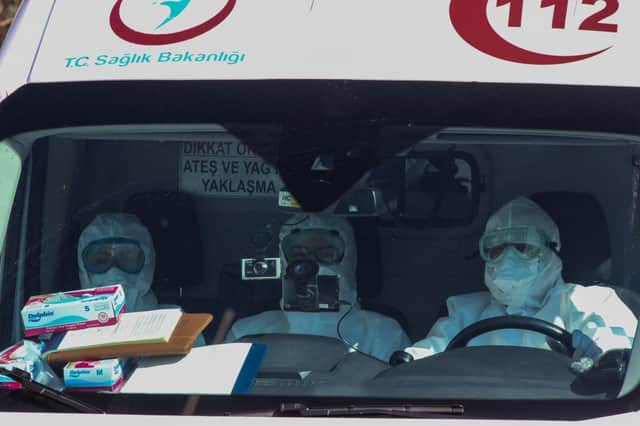Here's the official FCO coronavirus travel advice for Turkey


Covid-19 - the new coronavirus that's sweeping the globe - continues to spread.
There have now been recorded cases in nearly every European country, and globally the virus affects over 140 territories.
Advertisement
Hide AdAdvertisement
Hide AdOne of those countries is Turkey; a popular holiday destination, what is the Foreign and Commonwealth Office's (FCO) advice for travelling to the country?
Here's everything you need to know:
What's the 'official' travel advice?
The Foreign & Commonwealth Office (FCO) now advises British people against all non-essential travel worldwide. This advice took effect immediately on 17 March and applies initially for a period of 30 days.
The COVID-19 pandemic has led to unprecedented international border closures and other restrictions. All countries may restrict travel without notice.
If you now need to change or cancel your travel plans, follow these steps:
Advertisement
Hide AdAdvertisement
Hide Adcontact your airline, travel company, cruise line or other transport and accommodation providersget in touch with your insurance providercontinue to follow the NHS coronavirus guidance
The FCO was already advising against all but essential travel or all travel to some areas or countries due to risks that do not relate to COVID-19. This advice remains in place. Check FCO travel advice pages for the latest information.
Coronavirus: the facts
What is coronavirus?
COVID-19 is a respiratory illness that can affect lungs and airways. It is caused by a virus called coronavirus.
What caused coronavirus?
The outbreak started in Wuhan in China in December 2019 and it is thought that the virus, like others of its kind, has come from animals.
How is it spread?
Advertisement
Hide AdAdvertisement
Hide AdAs this is such a new illness, experts still aren’t sure how it is spread.
But, similar viruses are spread in cough droplets.
Therefore, covering your nose and mouth when sneezing and coughing, and disposing of used tissues straight away is advised.
Viruses like coronavirus cannot live outside the body for very long.
What are the symptoms?
The NHS states that the symptoms are: a dry cough, high temperature and shortness of breath - but these symptoms do not necessarily mean you have the illness.
Advertisement
Hide AdAdvertisement
Hide AdLook out for flu-like symptoms, such as aches and pains, nasal congestion, runny nose and a sore throat.
It’s important to remember that some people may become infected but won’t develop any symptoms or feel unwell.
What precautions can be taken?
Washing your hands with soap and water thoroughly.
The NHS also advises to cover your mouth and nose with a tissue or your sleeve (not your hands) when you cough or sneeze; put used tissues in the bin immediately and try to avoid close contact with people who are unwell.
Also avoiding touching eyes, nose and mouth unless your hands are clean.
Government advice
Advertisement
Hide AdAdvertisement
Hide AdAs of Monday 16 March the government advised that everyone should be observing social distancing - avoiding unnecessary travel and working from home where possible.
Anyone with a cough or cold symptoms now needs to self-isolate with their entire household for 14 days.
The government has now instructed bars, restaurants and theatres to close and will review on a ‘month to month’ basis.
Schools closed from Friday 20 March for the foreseeable future, and exams have been cancelled.
Advertisement
Hide AdAdvertisement
Hide AdThe over 70s or anyone who is vulnerable or living with an underlying illness are being asked to be extra careful and stay at home to self-isolate.
People with serious underlying health conditions will be contacted and strongly advised to undertake "shielding" for 12 weeks.
For more information on government advice, please check their website.
Should I avoid public places?
The advice now is to avoid public places and any non-essential travel.
Advertisement
Hide AdAdvertisement
Hide AdTravel abroad is also being advised against for the next 30 days at least, and many European countries have closed their borders.
What should I do if I feel unwell?
Don’t go to your GP but instead look online at the coronavirus service that can tell you if you need medical help and what to do next.
Sources: World Health Organisation and NHS